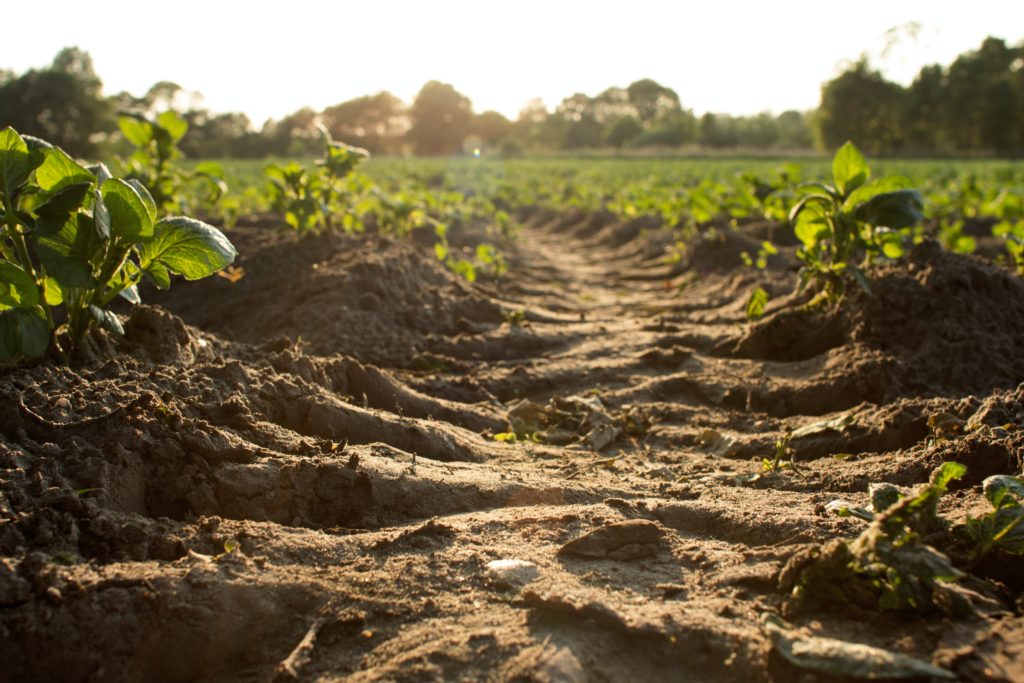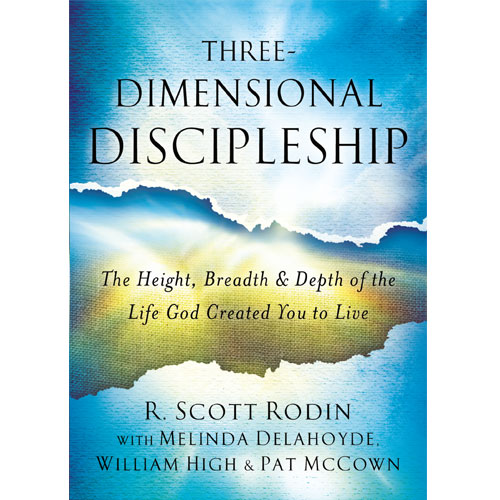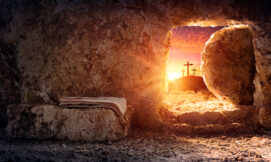How a Jar of Dirt Can Save America

It’s difficult to enter 2023 without some sense of foreboding. We seem to be living in an unrelenting tension between our firm conviction that God is on the throne, and the evidence of a nation that is spinning out of control. Every morning when I pray the petition from the Lord’s Prayer, ’thy will be done’ it elicits more apprehension than peace. Throughout God’s history with his people, he has met rebellion and godlessness with a withdrawal of his favor and protection. It’s hard not to see that happening across the pages of our daily news.
Three themes concern me the most as I look ahead to 2023. The first is the growing anger and divisiveness in our culture. It is coming out in surprising places, from school board meetings to airline flights, to restaurants and retail stores, to doctor’s offices and road rage, in shopping malls, schools and even across the family dinner table. Laura Beth Moss, founder of Growth Central Training and co-director of Growth Central, commented, “Anything can be divisive these days. What’s scary about our culture right now is we’re kind of getting addicted to divisiveness. It becomes part of our identity.”[1] That is a sobering thought. Our national identity is now defined by our anger, our inability to have civil discourse and the impossibility of constructive disagreement.
The second concern is the meteoric rise of what Carl Trueman calls ‘expressive individualism’.[2] In his compelling book, Trueman defines this term as follows, “Expressive individualism holds that human beings are defined by their individual psychological core, and that the purpose of life is allowing that core to find social expression in relationships. Anything that challenges it is deemed oppressive.”[3] The results are seen in every sector of our society. We demand our rights believing that as breathing human beings we have claim to the unequivocal entitlement to live according to our own personal set of values and mores. Even more, we believe that no one has the right to question, challenge, or critique our personal values and decisions. We must be free to express our individuality in whatever ways might bring us the promise of happiness. The anathema of our age lies in any claim that our rights may be either flawed, or misaligned with a larger ethical or moral standard.
The third concern is the spiritual confusion that swirls around and through these other issues. In our quest to live for ourselves, we must either reimagine the nature of God or jettison him altogether. The former approach is now a guiding methodology of most mainline denominations that are desperately grasping at whatever cultural conformity and theological compromise might stem the hemorrhage of parishioners. We are in an age of aggressive deconstruction of the pillars of orthodox Christianity. The reason, I believe, lies in the collision of the Biblical call to ‘deny yourself, take up your cross and follow’ with Trueman’s understanding of a culture that is increasingly hostile to any idea of yielding its control over its own definition of the pursuit of happiness.
In these and so many other themes in our culture, we are watching the transition from a theocentric worldview to an anthropocentric understanding of all of life. Many of us grew up with the image of a throne that symbolized the seat of control of our lives. We were told that the throne can only have one of two occupants: God or us. For most of my adult life, the tension has been one of lordship; between how much of my life I’m willing to let God be on the throne, and where am I still trying the play the lord. In the early decades of my adult life, this ‘God vs. me’ tension was the primary issue for the vast majority of Christians, and even beyond to the general God-believing American public. In 1972 roughly 90% of Americans identified as Christian. That is now 64%. At the same time, the ‘nones’ made up just 5% of the US adult population in 1972. They are now at 30% with the possibility of becoming the majority of the population before 2070.[4]
This means that in 1972, the general population struggled with how and where God fit into their lives. Today, a growing sector of our society has displaced that tension by eliminating God from the equation. In his place a new tension has arisen; how far can I push to get every right that is mine and live as unencumbered as possible by the rules and mores of others? While this may not be news, what is most troubling to me is how this new tension has moved surreptitiously into the church.
Space does not permit a thorough examination of this movement, so I will offer a rather sweeping generalization. For far too many churches, the foundational teachings of sin, repentance, obedience, surrender and sacrifice have been set aside so as not to cause offense. Along with these tenets of orthodox Christianity, we have abandoned a passion for evangelism, a vision for the completion of the Great Commission, and a genuine concern over the eternal consequences for those who reject the gospel. As a result, the Church has lost its voice and influence in our culture.
These three concerns are integrally linked by the singular issue of identity. The Church has shifted away from its identity as the bride of Christ to a definition of success based on the three ‘B’s’, buildings, bucks, and butts. For a church to remain ‘relevant’, keep up its numbers and avoid controversy, church leaders have too often adopted an ownership approach to ministry, believing they are responsible for its provision, sustainability, and impact. God is along for the ride, but church strategy, programs and messaging are driven by the need to please the laity and look as inviting as possible to newcomers. Francis Chan laments, ”God designed the church to be much more than what the majority of us experience in America. There are many of us who believe this and want change.“[5] Mike Breen writes, “Most of us have become quite good at the church thing. And yet, disciples are the only thing Jesus cares about, and it’s the only number that Jesus is counting.”[6] Having lost its identify in Christ, the Church in the US is behaving more like a business selling services than a transformational community of radical disciples.
The decline of the voice and influence of the church has created a vacuum of identity into which secular humanism has happily stepped. It offers a counter belief that identity is whatever you want it to be. Underlying the issue of gender fluidity is a larger sense of identity fluidity. When your identity is based on nothing, it is free to become everything and anything. Yet in doing so, this so-called freedom is actually a form of bondage that leaves people wandering around looking for some anchor, some certainty that their chosen identity has some greater value and worth. When they find none (and there is none), the reaction is anxiety, confusion, and desperation. This is in part what is fueling our cultural anger, toxic communication, hostile viewpoints, and general civil nastiness. As Aleksandr Solzhenitsyn put it, “Men have forgotten God; that’s why all this has happened.”[7]
So, what is our hope in 2023? I believe it is found in a simple jar of dirt. To understand the meaning of this icon, let me reframe the problem as a battle between ownership and stewardship. The three concerns above are the product of an owner mindset that views the world from the perspective of control, personal rights, and protectionism. It is fear based and fuels antagonism and division. Owners believe their life is up to them to control and manipulate in order to bring about the best possible personal outcome. They may not even know what that is, but the pursuit of it requires constant vigilance lest anything challenge or hinder its achievement.
Into the midst of this worldview comes the person of Jesus Christ. In Him we have revealed the heart of our Creator God of whom the Psalmist says, “The earth is the Lord’s and everything in it. The world and all who live in it.” Psalm 24:1. The Apostle Paul defines the human in wholly theocentric terms, “You are not your own; you were bought at a price.” 1 Corinthians 6: 19-20. He continues in Ephesians 2:10, “For we are God’s handiwork, created in Christ Jesus to do good works, which God prepared in advance for us to do.” John reminds us of our true identity, “Yet to all who did receive him, to those who believed in his name, he gave the right to become children of God—children born not of natural descent, nor of human decision or a husband’s will, but born of God.” John 1:12-13. Paul speaks for every true follower of Jesus, “I have been crucified with Christ and I no longer live, but Christ lives in me. The life I now live in the body, I live by faith in the Son of God, who loved me and gave himself for me.” Galatians 2:20.
The univocal theme in scripture regarding humanity is that we were created in the image of God and called to bear that image as followers of Jesus Christ. Because our lives are not our own, that we have been bought with a price, that it is no longer we who live but Christ who lives in us, we can conclude that the true and proper identity of the follower of Jesus is that of the faithful steward.
In a world that is claiming its own rights, stewards abandon such claims and surrender fully to Christ. In a culture bent on demanding unhindered expression of any and every possible identity, stewards seek to be faithful witnesses to the One in whom they have their only identity. In a society that champions the rise of the self to the throne of all aspects of life, stewards are called to renounce all forms of ownership and take on the mantle of the obedient steward, bowing to only one King.
Imagine the impact on our church and culture if even a remnant of those who profess to follow Jesus would surrender themselves into the hands of Jesus? If the hope of our nation is the revival of the place of God and the restoration of the values of His kingdom in our life and work, then it must begin with a deeper sense of surrender by those who follow Jesus. It will require a movement of stewards.
In January 2022, we published The Steward Declaration as a call to the church to catalyze just such a movement. This January, we announce the publication of A Call to Action, a companion study guide to The Steward Declaration. It’s available as an e-book and paperback, and I would encourage you to get it and read it prayerfully.
So, what about the jar of dirt? I have used this icon to illustrate one important fact. Dirt is where we began, “Then the Lord God formed a man from the dust of the ground and breathed into his nostrils the breath of life, and the man became a living being.” Genesis 2:7 And dirt is where our bodies will end up, “By the sweat of your brow you will eat your food until you return to the ground, since from it you were taken; for dust you are and to dust you will return.” Genesis 3:19. Between the dirt that was our beginning and the dirt that will be our end, everything in between, everything belongs to God. It’s all His. Abraham Kuyper put it this way, “There is not a square inch in the whole domain of our human existence over which Christ, who is Sovereign over all, does not cry, Mine!”[8]
Could a new movement of faithful stewards reclaim for the church its true identity? And could such a church influence our society with the kingdom values that once formed its moral foundation? And if such a foundation were reestablished, might it speak boldly into our national identity crisis and revive a return to the Creator in whose image we are all created? In this way, could our jar of dirt be the first step in healing our nation?
Unrealistic? Pie in the sky? Perhaps. But as followers of the King, can we do any less than offer our selves fully for such a pursuit?
I encourage you to fill a jar with dirt and place it where you can see it every day. May it remind you that your life is not your own. You have been bought with a precious price. It is no longer you who live but Christ who lives in you. You were created to be a steward set free to live the fully surrendered life in Christ. And as a steward your identity is sure, certain, and founded on the Rock.
I believe the salvation of our country depends on the extent to which we, as followers of Jesus, reclaim this identity and start living and leading as such stewards. Will it begin with us? With you?
Read The Steward Declaration and A Call to Action, get your jar of dirt, and see what miraculous things God may do in and through you in 2023.
[1] https://kiwanismagazine.org/2022/01/17/why-is-everybody-so-angry/
[2] Carl Trueman, The Rise and Triumph of the Modern Self. (Crossway Publishing, 2020)
[3] Trueman.
[4] https://www.pewresearch.org/religion/2022/09/13/modeling-the-future-of-religion-in-america/
[5] Francis Chan, Letters to the Churches. (David C. Cook Publishing, 2018) pp. 26-27
[6] Mike Breen, Building a Discipling Culture: How to Release a Missional Movement by Discipling People as Jesus Did (3DM Publishing, 2017)
[7] Aleksandr Solzhenitsyn, A World Torn Apart.
[8] Inaugural address at the dedication of the Free University. Found in Abraham Kuyper: A Centennial Reader, ed. James D. Bratt (Eerdmans, 1998), 488)





